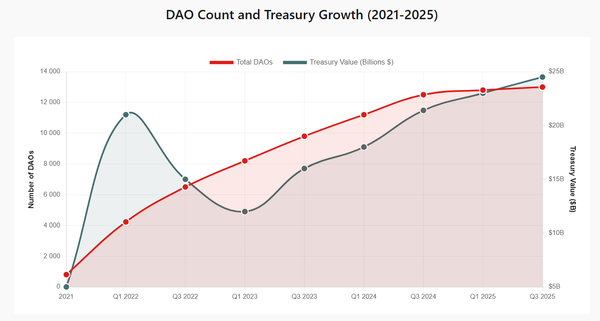Security Concerns Slow AI Agent Integration in DAO and Crypto Ecosystems

AI agents have become the latest focus for crypto market participants in 2025, with integration attempts across DeFi, gaming, infrastructure, and DAO governance. The number of AI agents has grown by an average of 33% monthly according to the AI Agents Directory.
Despite this growth, Web3-based AI solutions represent just 3% of the overall AI agent ecosystem. Dr. Max Li, founder and CEO of decentralized cloud network OORT, believes the space is advancing faster than its supporting infrastructure can handle.
According to Dr. Li, security and compliance pose greater threats than scalability issues. Questions about data ownership, GDPR compliance, and handling sensitive information on-chain remain unresolved. "These may already be more significant barriers than scalability," he warned.
The data privacy question is particularly relevant as Web3 tools like iExec's Data Protector emerge to counter traditional data harvesting. These solutions allow users to control access to their information and potentially monetize their attention, creating a counterbalance to current free-service internet models.
Enterprise adoption faces significant challenges as well. Dr. Li suggests that while companies like Walmart might benefit from AI for internal operations, they have little incentive to tokenize these agents. Most enterprises prefer keeping data within secured servers rather than exposing it on public, decentralized networks.
The market for AI agent tokens has exploded in 2025, attracting substantial capital. However, Dr. Li compares the situation to the dot-com bubble, stating, "It's fair to say there's a bubble forming here." This view aligns with Binance founder Changpeng Zhao, who recently cautioned that most AI token projects launch prematurely.
Regulatory challenges may present the most underappreciated risk. The intersection of open AI systems, tokenized data, and borderless blockchains creates numerous compliance issues. Dr. Li highlighted unresolved contradictions between transparency and privacy, and questions of liability when autonomous agents cause financial losses.
Dr. Li concludes that crypto must shift focus from hype to functionality—prioritizing agent design over token creation. Until then, the integration of AI agents into tokenized crypto ecosystems remains a high-risk frontier with fragile infrastructure and incomplete legal frameworks.





